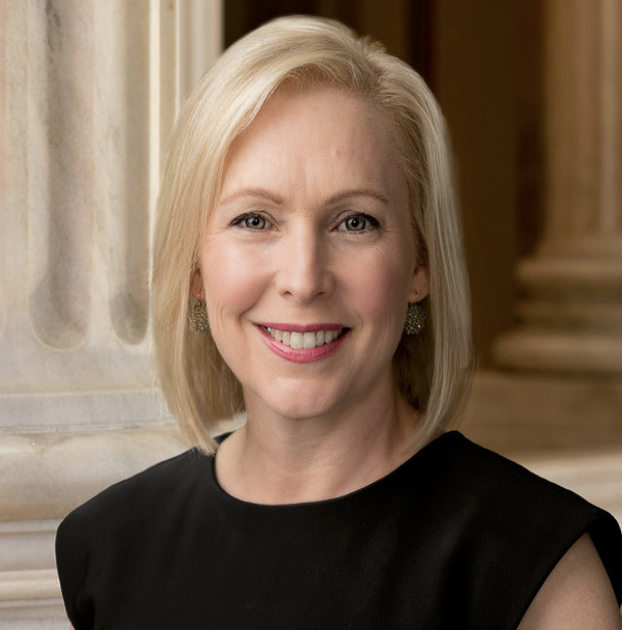
James Buckser
Staff writer
U.S. Sen. Kirsten Gillibrand often reaches across the aisle, and works on a bipartisan basis frequently, she said. She just finished working on a defense bill, and is eyeing a farm bill — both of which are “widely bipartisan.”
“It’s much less difficult than people think,” she said.
The junior senator for New York, Gillibrand is a member of the Senate Armed Services Committee, Senate Select Committee on Intelligence, Senate Agriculture Committee and Senate Aging Committee. She has had a hand in legislation including the 9/11 Responder and Survivor Health Funding Correction Act of 2023, the Bipartisan Safer Communities Act and the STOCK Act.
In a special presentation, Gillibrand will speak at 12:30 p.m. today in the Amphitheater.
Gillibrand said she’ll focus on “how we should preserve and advance democracy,” and discuss issues and legislation she’s focusing on. These include the Voter Empowerment Act, the Equal Rights Amendment, legislation on stock trading by members of Congress, and creating a call to public service.
The Voter Empowerment Act, Gillibrand said, is a bill she originally wrote with the late U.S. Rep. John Lewis, aiming to “strengthen voting rights and fight back against a lot of the right wing legislatures across the country that are seeking to disenfranchise voters.”
Gillibrand, who has been New York State’s junior senator since 2009, called the bill comprehensive; it included modernizing voting, increasing participation and early voting, vote by mail, and prohibiting tactics like voter intimidation. She also plans to discuss the Equal Rights Amendment, which she said would “enshrine equality into the Constitution.”
“I believe that this approach would also protect a lot of women’s reproductive freedoms and right to privacy and other issues that are being denied across many states right now because of the Dobbs decision” that overturned Roe v. Wade, Gillibrand said.
The amendment, Gillibrand said, has already been ratified by two-thirds of the states and been passed by two-thirds in both houses of Congress.
“We believe that all that’s left to be done is to have it signed and published by the archivist,” Gillibrand said. “We think that’s actually all that needs to be done — that the provisions in the law that had a time limit were in the preamble, not the actual law itself, and so they’re not dispositive.”
Thirdly, Gillibrand said she plans to discuss a recent piece of legislation, a bipartisan bill with U.S. Sen. Josh Hawley (R-MO) banning stock trading by members of Congress and their spouses, senior members in administration and their spouses, and everyone’s dependent children.
“That would be a great way to create more transparency and accountability in Congress,” Gillibrand said. “People could have, hopefully, more faith in members of Congress that they’re not getting elected to get rich.”
Ten years ago, Gillibrand said she passed a law requiring transparency in trading among Congresspeople.
“I thought that if we had to disclose what purchases and sales we were making that the Department of Justice could prosecute people who are clearly buying and selling nonpublic information, but we really haven’t seen that level of prosecution,” Gillibrand said.
One in seven members of Congress, Gillibrand said, do not disclose their stock trades, and members of Congress have a higher return rate than the S&P 500.
“I don’t think it’s a question of members of Congress just being smarter in stock trading,” Gillibrand said. “I think they are trading on nonpublic information.”
Gillibrand said she expected some pushback on the bill, “since one in seven are not disclosing their trades and one in three are actually trading stocks.”
“It is something that’s common sense,” Gillibrand said. “There’s so much data and information that members of Congress just aren’t handling this properly, and they’re not following the law as it’s currently written.”
Lastly, Gillibrand said she plans to discuss ways to increase participation in public service, including college tuition assistance.
One part of the effort to reward public service is based on an existing piece of legislation, Gillibrand said, which has just been “fixed.”
“I want to improve that by offering free college and community college for five years of public service,” she said.
Gillibrand said she wants a “full augmentation of the GI Bill” for all public service.
“What we’ve done so far in the defense bill is created the first-ever cyber academy, which will be free college in exchange for five years of service in cyber,” Gillibrand said, which would include 100 slots per year for any cyber-related job such as “going to the NSA, going to the CIA, going to the Space Force in non-military roles.”
“It’s another step towards free college in exchange for public service,” she said.
After her presentation today, Gillibrand hopes Chautauquans and constituents feel that she’s “working for them,” and that she has “a lot of ideas about how to strengthen our democracy,” with some being “very strong bipartisan ideas that may be made into law.” She also hopes to impress that “that our democracy is worth fighting for and that people have to fight for it.”




